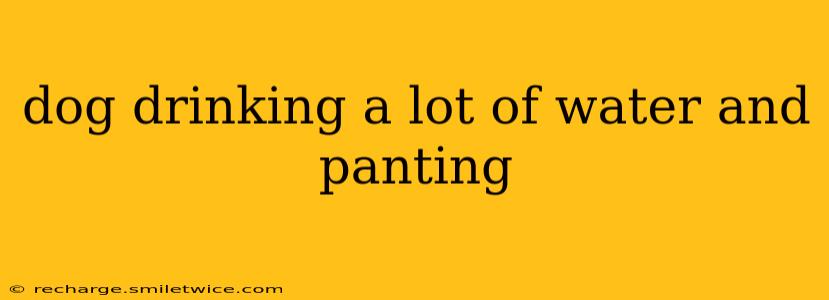Many dog owners worry when their canine companion starts drinking excessive amounts of water and panting heavily. While occasional increased thirst and panting can be normal, particularly after exercise or in hot weather, consistent excessive water intake and panting can signal an underlying health issue. This comprehensive guide will explore the potential causes, when to seek veterinary attention, and how to best support your furry friend.
What Causes Increased Water Intake and Panting in Dogs?
Several factors can contribute to a dog drinking more water and panting more frequently. These range from benign causes to more serious medical conditions. Let's examine some of the most common reasons:
Increased Physical Activity or Hot Weather:
This is perhaps the most common reason. After strenuous exercise or during hot weather, dogs naturally pant more to regulate their body temperature and lose excess heat. Increased water intake replenishes fluids lost through panting and sweating (dogs sweat through their paws).
Underlying Medical Conditions:
More serious medical conditions can cause increased thirst (polydipsia) and panting (dyspnea). These include:
- Diabetes Mellitus: Dogs with diabetes have difficulty regulating blood sugar levels. Their bodies try to flush out excess glucose through urine, leading to increased thirst and urination.
- Kidney Disease: Damaged kidneys can't effectively filter waste products from the blood. This leads to an accumulation of toxins, stimulating increased thirst as the body tries to dilute the toxins.
- Cushing's Disease (Hyperadrenocorticism): This hormonal disorder affects the adrenal glands and can cause increased thirst, urination, and panting.
- Liver Disease: Similar to kidney disease, liver problems can disrupt the body's fluid balance, resulting in increased water consumption.
- Infections: Urinary tract infections (UTIs), infections elsewhere in the body (like the mouth), can also cause increased thirst and panting as the body fights the infection.
- Hyperthyroidism: An overactive thyroid gland can lead to increased metabolism, causing increased thirst and panting.
Is my Dog's Panting and Water Consumption Excessive? How Can I Tell?
Determining if your dog's water intake and panting are truly excessive requires careful observation. Consider these factors:
- Frequency: How often is your dog drinking water? Is it significantly more than usual?
- Amount: How much water is your dog drinking per day? A sudden and marked increase is a cause for concern.
- Duration: Has this increased thirst and panting been ongoing for a few days or weeks, or is it a recent occurrence?
- Other symptoms: Is your dog exhibiting other symptoms such as lethargy, vomiting, diarrhea, weight loss, changes in urination, or difficulty breathing?
When Should I Take My Dog to the Vet?
If you notice a significant increase in your dog's water intake and panting accompanied by any other concerning symptoms, it's crucial to seek veterinary attention immediately. Don't wait to see if it improves on its own. Prompt veterinary care can be vital for diagnosing and treating underlying conditions.
What Tests Might My Vet Perform?
Your veterinarian will likely conduct a thorough physical exam and may order several diagnostic tests to determine the underlying cause of your dog's increased thirst and panting. These tests may include:
- Blood tests: To assess kidney function, liver function, blood sugar levels, and other indicators.
- Urinalysis: To check for signs of infection, diabetes, or kidney disease.
- X-rays or ultrasounds: To visualize internal organs and identify any abnormalities.
Can Diet Affect My Dog's Water Intake?
While diet isn't typically the primary cause of excessive water intake and panting, certain dietary factors can play a role. A diet high in sodium, for example, can increase thirst. Consulting your veterinarian about your dog's diet, especially if you've recently made changes, is wise.
How Can I Help My Dog if They are Drinking Excessively and Panting?
Providing fresh, clean water at all times is essential. If your dog is panting heavily, try to ensure they are in a cool, well-ventilated environment. Avoid strenuous activity during hot weather. However, remember that these are supportive measures, not treatments for underlying medical conditions. Addressing the root cause is vital for your dog's health and well-being.
This information is for general knowledge and does not constitute veterinary advice. Always consult with your veterinarian for any concerns about your dog's health. They can accurately diagnose the cause of your dog's symptoms and develop an appropriate treatment plan.
